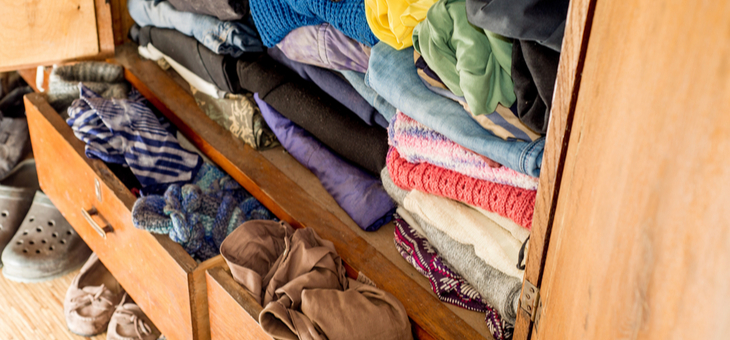A few old newspapers in the rack, special silverware saved for dinner parties and a box marked ‘spare cables’ are all okay in my eyes. It’s when wardrobes and drawers are overflowing, and the stairs have turned into an obstacle course that I start to worry and know I need to declutter.
Clutter means something different to almost everyone. After all, one man’s trash is another man’s treasure – or so they say.
Generally, though, clutter can be divided into two main types:
- memory clutter – items that remind you of important events and people
- someday clutter – items you won’t get rid of because you feel you might need them in the future.
A bit of chaos can have some upsides. A study published in Psychological Science found a messy desk encourages creativity. But more often than not, clutter causes distress and can even be damaging for your physical and mental health.
Here are some good reasons to have a neater home and workplace.
Mess equals stress
When everything is in its place, you can rest easy knowing you’ll be able to find essential items when you need to. If you have to leave the house quickly, you can grab your purse, glasses and car keys and go about your day. Having a designated place for things saves time and hassle.
Read more: Simple steps to curb clutter
A 2009 study found higher levels of the stress hormone cortisol in mothers living in a cluttered home environment.
Long-term activation of the stress response system and overexposure to cortisol and ensuing stress hormones can disrupt almost all your body’s processes. This puts you at increased risk of many health problems, including:
- anxiety
- depression
- digestive problems
- headaches
- muscle tension and pain
- heart disease, heart attack, high blood pressure and stroke
- sleep problems
- weight gain
- memory and concentration impairment.
Procrastination is tied with clutter
An intergenerational study examining the relationship between procrastination and clutter found that those with excess clutter in their homes had lower life satisfaction.
The older cohort was more likely to put off making decisions about what to get rid of, too, as sorting through and throwing items away is often an unpleasant task.
Read more: Technology can help you tidy your home
Clutter is bad for your brain
Your brain likes order, and constant visual reminders of disorganisation drain your cognitive resources, reducing your ability to focus.
In 2011, neuroscience researchers using fMRI (functional magnetic resonance imaging) found clearing clutter from the home and work environment resulted in a better ability to focus and process information, and led to increased productivity.
Cluttered cupboards and piles of paper stacked around the house can have a cumulative effect, making you stressed and distracting you from things you need to achieve.
The visual distraction of clutter also increases cognitive overload and can reduce your working memory.
Clutter accumulates dust
Having too much stuff can make it hard for you to keep your space clean. If you’re allergic to things such as dust mites or pet dander, decluttering should make it easier to dust and vacuum and get symptoms such as sneezing, wheezing and itchy eyes under control.
Clutter can lead to embarrassment and isolation
A tidy house feels comfortable and inviting for the occupants and visitors alike. A cluttered home can be the opposite.
Family and friends of hoarders typically use language such as ‘suffocating’ or ‘overwhelming’ when asked to describe the home. These feelings can lead people to avoid visits or the owner of the home shutting people out to save face.
Read more: When hoarding becomes a health problem and how to talk about it
This can take a toll on relationships and cause feelings of sadness or loneliness. That could be one reason a hoarding disorder tends to overlap with depression and anxiety disorders.
Slip and trip hazards
Whether it’s tripping over something on the stairs or stubbing your toe on a box full of memories, living with lots of clutter puts you at risk of injury.
Shelves stuffed to the brim can also be a hazard if something falls off or a piece of overloaded furniture topples over.
It can lead to weight gain
People with homes filled to the brim with clutter are more likely to overeat. One study found participants using a ‘chaotic’ kitchen ate twice as many cookies as those in an organised environment.
Another study found people with hoarding disorders were more likely to binge eat.
Clutter can be a fire hazard
If you’re keeping hold of a lot of paper or other flammable items, your home can be a fire hazard.
Even if a fire starts in the most common of ways (cooking oil goes up in flames or a burner catches the edge of your dish towel), clutter makes it harder to get help. Not only will you have more trouble getting out in time if your pathways and exits are blocked, but it will also be harder to put out the blaze.
What to do about it
Some good advice I’ve heard is, if you’re planning to declutter – don’t pick anything up. Have somebody else hold up each item and ask whether you need it. Once you touch an item, emotional attachment kicks in and you’ll be less likely to get rid of it.
Another option is to make a conscious effort to acquire fewer things. Consider whether you truly need an item before purchasing it. Once it’s in the house, it’s a lot harder to deal with as you can become attached to the things you own.
Do you actively declutter each year? How do you avoid piles of clutter in your home? Share your thoughts in the comments section below.
If you enjoy our content, don’t keep it to yourself. Share our free eNews with your friends and encourage them to sign up.

